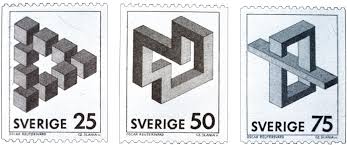The Mind Is Flat
The Illusion of Mental Depth and the Improvised Mind
Nigel Chater
More books on Mind
Intuition and "common sense" are a very poor guide to knowledge. For two thousand years we had 'common sense' 'obvious' beliefs about most aspects of science. We have no intuitive grasp of difference between heat and temperature, weight and mass. The laws of motion, thermodynamics and most other things that govern the physical world are strange and non-intuitive.
Our understanding of our mental processes is the same.

We have a 'commom sense' idea that our mind perceives a full picture, in 3D, of what we see before us. Oscar Reutersvard's impossible objects demo what's wrong with that idea. We can't have a 3D pic bc they are not possible in 3D. And we don't take in the whole image at once; we take in fragments and attempt to make sense of them. But we are (dangerously) confident that we are actually looking at areal 3D object.
Ask someone to picture to themselves a tiger. "OK I've got it" they say. So then ask them how many stripes are there on the tiger's tail. This is not easy to do, and you start to realise that you are actually making it up as you go. Then ask how do the stripes on the body go - do they run lengthwise or are they hoops. OK they're hoops. Do these hoops extend down the tiger's legs or do they change to hoops around the legs? So how and where do they change from body hoops to leg hoops?


We can fluently answer any of the questions, but by making it up as we go along, not by consulting the original image you were asked to imagine.
Our dreams seem very real when we're having them, but as soon as we wake up and try to recall them we realize they are a fictional jumble of fragments and contradictions.
The brain can basically take on one task at a time. Some things (breathing) can run on total autopilot, some things (driving) can run on habit as long as nothing unusual happens that requires interpretation (but if something does happen, takes significantly longer to realize it and to take action). When brain is trying to figure something out, it co-opts all the networks to do so. Whatever is occupying our attention engages large swathes of the brain.
Even conversation with a passenger can distract driver, but what happens is that when difficult driving situation appears. both passenger and driver notice and slow down conversation or stop talking altogether. But if you're talking on a phone the other person can't see the situation, so keeps talking normally, and driver feels socially obliged to maintain his end. This is why all cell phone calls are dangerous, even hands free ones.
Patients with visual neglect (when large bits of the cortex damaged so that a large part of visual field inoperative) are entirely unaware of the defect. They see the bit in front of them. We do exactly the same.
Chess grandmasters don't have some phenomenal memory. They can recall (most) of a chess board with just a glance, as long as it is from a real game. If it's a random assortment of pieces, grandmaster no better than anyone else. Shows that he is recognizing a familiar pattern.
More books on Sport and Games
Books by Title
Books by Author
Books by Topic
Our dreams seem very real when we're having them, but as soon as we wake up and try to recall them we realize they are a fictional jumble of fragments and contradictions.
The brain can basically take on one task at a time. Some things (breathing) can run on total autopilot, some things (driving) can run on habit as long as nothing unusual happens that requires interpretation (but if something does happen, takes significantly longer to realize it and to take action). When brain is trying to figure something out, it co-opts all the networks to do so. Whatever is occupying our attention engages large swathes of the brain.
Even conversation with a passenger can distract driver, but what happens is that when difficult driving situation appears. both passenger and driver notice and slow down conversation or stop talking altogether. But if you're talking on a phone the other person can't see the situation, so keeps talking normally, and driver feels socially obliged to maintain his end. This is why all cell phone calls are dangerous, even hands free ones.
Patients with visual neglect (when large bits of the cortex damaged so that a large part of visual field inoperative) are entirely unaware of the defect. They see the bit in front of them. We do exactly the same.
Chess grandmasters don't have some phenomenal memory. They can recall (most) of a chess board with just a glance, as long as it is from a real game. If it's a random assortment of pieces, grandmaster no better than anyone else. Shows that he is recognizing a familiar pattern.
More books on Sport and Games
Books by Title
Books by Author
Books by Topic